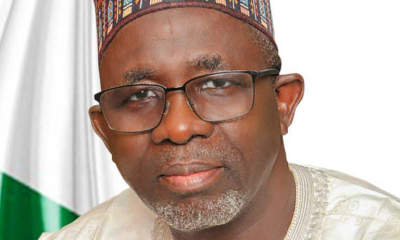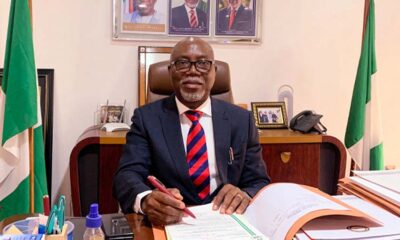Business
How CBN countered First Bank coup

Many must have been taken by surprise by the changes that swept through First Bank of Nigeria Limited and FBN Holdings Plc Wednesday and Thursday.
The removal and reinstatement of FirstBank CEO Sola Adeduntan and subsequent sacking of the entire board and management of the two institutionsspeak volumes of the Central Bank of Nigeria (CBN’s) regulatory powers as contained in the Bank and Other Financial institutions Act 2020.
Adeduntan has since resumed at his desk in line with the directives of the apex bank and looks set to reinvent itself.
Nobody saw two leadership changes in First Bank of Nigeria Limited and FBN Holdings Plc within 48 hours coming.
But when they finally occurred, they set precedents that regulatory powers could be activated where corporate governance practices are breached.
The first change in leadership saw the six-year tenure of FirstBank Managing Director/CEO Sola Adeduntan brought to sudden end, eight months to its expiration.
The Board of First Bank of Nigeria Limited at its meeting Wednesday had approved the appointment of Gbenga Shobo, Deputy Managing Director, as the Managing Director/CEO designate of the bank sending Adeduntan to early retirement.
Also appointed were Abdullahi Ibrahim as Deputy Managing Director, while Ini Ebong, Segun Alebiosu, Seyi Oyefeso and Mrs. Bashirat Odunewu, were also appointed as Executive Directors.
The following day, the Central Bank of Nigeria (CBN) Governor, Godwin Emefiele, reversed the appointments and sacked the entire Board of FirstBank and FBN Holdings Plc.
Emefiele immediately announced the appointment of new Board and Management for First Bank of Nigeria Limited and FBN Holdings Plc.
The total management and board reshuffle saw Adeduntan returned as the Managing Director/CEO of First Bank of Nigeria. Emefiele said he was satisfied working with Adeduntan on the bank’s stabilisation plan since 2016. Shobo was also returned to his former position as Deputy Managing Director/CEO for the bank.
Emefiele said the Management of the CBN acted in line with its powers under Bank and Other Financial Institutions Act (BOFIA) 2020.
In the new appointments, Remi Babalola was appointed the new Chairman, FBN Holdings. He replaced Oba Otudeko, the former Chairman.
The new directors are Dr. Fatade Abiodun Oluwole, Kofo Dosekun, Remi Lasaki, Dr Alimi Abdulrasaq, Ahmed Modibbo, Khalifa Imam, Sir Peter Aliogo and UK Eke – Managing Director.
The CBN also named Tunde Hassan-Odukale as Chairman, First Bank of Nigeria Limited. He replaced Mrs. Ibukun Awosika. The new directors of the bank are Tokunbo Martins, Uche Nwokedi, Adekunle Sonola, Isioma Ogodazi, Ebenezer Olufowose, Ishaya Elijah B. Dodo. Remi Oni was appointed Executive Director and Abdullahi Ibrahim also appointed as Executive Director.
The apex bank has also reassured the depositors, creditors and other stakeholders of the bank of its commitment to ensure the stability of the financial system.
“There is therefore no cause for panic amongst the banking public, given that the actions being taken are meant to strengthen the bank and position it as a banking industry giant,” the apex bank said.
According to Emefiele, the board is vested with the authority to make changes in the management team subject to CBN approval.
However, the CBN considers itself a key stakeholder in management changes involving FBN due to the forbearances and close monitoring by the bank over the last five years aimed at stemming the slide in the going concern status of the bank.
“It was therefore surprising for the CBN to learn through media reports that the board of directors of FBN, a systemically important bank under regulatory forbearance regime had effected sweeping changes in executive management without engagement and/or prior notice to the regulatory authorities,” Emefiele said.
He said the action by the board of FBN sends a negative signal to the market on the stability of leadership on the board and management and it is in light of the foregoing that the CBN queried the board of directors on the unfortunate developments at the bank.
FBN is one of the systemically important banks in the Nigerian banking sector given its historical significance, balance sheet size, large customer base and high level of interconnectedness with other financial service providers, amongst others.
He said FBN has over 31 million customers, with deposit base of N4.2 trillion, shareholders’ funds of N618 billion and NIBSS instant payment (NIP) processing capacity of 22 per cent of the industry.
Emefiele said it is imperative to protect the minority shareholders that have no voice to air their views, also important, is the protection of the over 31 million customers of the bank who see FBN as a safe haven for their hard-earned savings.
He said FirstBank maintained healthy operations up until 2016 financial year when the CBN’s target examination revealed that the bank was in grave financial condition with its capital adequacy ratio (CAR) and non-performing loans ratio (NPL) substantially breaching acceptable prudential standards.
He attributed the problems at the bank to bad credit decisions, significant and non-performing insider loans and poor corporate governance practices. The shareholders of the bank and FBN Holding Plc also lacked the capacity to recapitalise the bank to minimum requirements. These conclusions arose from various entreaties by the CBN to them to recapitalise.
Emefiele said the CBN stepped in to stabilise the bank in its quest to maintain financial stability, especially given FBN’s systemic importance as enumerated earlier.
The CBN boss said: “The bank maintained healthy operations up until 2016 financial year when the CBN’s target examination revealed that the bank was in grave financial condition with its capital adequacy ratio (CAR) and non-performing loans ratio (NPL) substantially breaching acceptable prudential standards.
“The problems at the bank were attributed to bad credit decisions, significant and non-performing insider loans and poor corporate governance practices.
“The shareholders of the bank and FBN Holding Plc also lacked the capacity to recapitalise the bank to minimum requirements. These conclusions arose from various entreaties by the CBN to them to recapitalise.”
However the CBN, Emefiele said, stepped in to stabilise FBN with the “appointment of a new Managing Director/Chief Executive Office in January 2016.”
CBN’s interventions to save FirstBank
Other interventions highlighted by the CBN governor to save FBN from collapse, include granting it “regulatory forbearances to enable the bank work out its non-performing loans through provision for write off of at least N150 billion from its earning for four consecutive years.
“Another is the granting of concession to insider borrower to restructure their non-performing credit facilities under very stringent conditions and the renewal of the forbearances on a yearly basis between 2016 and 2020 following thorough monitoring of progress towards exiting from the forbearance measures.”
Emefiele said he was shocked to hear of the sack Adeduntan from media reports after he had made entreaties that the former FBN Holding chairman should pull the brake.
The CBN governor said an interested party leaked information to him about plans to sack Adeduntan. To stop the move, he said he called Otudeko and “spoke to him that such changes will require CBN approval.”
Emefiele said he pleaded with Otudeko, sent a shareholder to also plead with him not to go ahead with the decision but they went ahead all the same.
He described FBN as a systemically important bank in the Nigerian banking sector “given its historical significance, balance sheet size, large customer base and high level of interconnectedness with other financial service providers, among others.”
Stock movement
The shares of FBN Holdings (FBNH) Plc on Thursday dropped 6.76 per cent to N6.90 per share. There were no changes in the bank’s shares on Friday.
The FBNH began the year with a share price of N7.15 but has since lost 3.5 per cent off that price valuation, ranking it 109th on the Nigeria Stock Exchange in terms of year-to-date performance.
FBN Holdings Plc is the non-operating holding company of First Bank of Nigeria Limited, a commercial bank with operations in 10 countries.
FirstBank speaks on development
In a statement released Friday and signed by Mrs. Folake Ani-Mumuney Group Head, Marketing & Corporate Communications, the bank said: “We refer to the CBN pronouncement on the reconstitution of the Board of Directors of First Bank of Nigeria Limited. Further to the press conference held by the Governor of the Central Bank of Nigeria, Mr. Godwin Emefiele on Thursday, 29 April 2021, the Boards of FBN Holdings Plc and First Bank of Nigeria Limited were dissolved and reconstituted, pursuant to its power under Banks and Other Financial Institutions Act (BOFIA) 2020.
“Adesola Adeduntan has since resumed work as CEO in line with the directives of the CBN. We can confirm that the bank is cooperating with the CBN and other regulators while the operations of the bank are not hampered or hindered in any way and are in fact running smoothly. We further wish to reassure the public, our esteemed customers and stakeholders in the words of the Governor of the Central Bank in concluding his press conference.
“The CBN hereby reassures the depositors, creditors and other stakeholders of the bank of its commitment to ensuring the stability of the financial system. There is therefore no cause for panic amongst the banking public, given that the actions being taken are meant to strengthen the Bank and position it as a banking industry giant,” the bank stated.
Others stakeholders speak
Former President, Chartered Institute of Bankers of Nigeria (CIBN), Okechukwu Unegbu, said FirstBank is systematically important bank, but faced serious crisis emanating from poor corporate governance practices.
He said the leadership changes instituted by the bank’s former boards and management failed to realise the power of the CBN to correct any anomaly instituted by board or management.
He said had the CBN not intervened, there could have been a run on the bank, and the high esteem on which the bank is held in the minds of Nigerians meant that it could threaten financial system stability.
He said: “The CBN acted rightly by reversing the leadership change at FirstBank and also letting go of the old board that had been part of the problem of the bank through poor corporate governance practices. The action taken by the CBN will boost foreign investors’ confidence in the economy.”
In the view of President, Bank Customers Association of Nigeria (BCAN) Uju Ogubunka, the challenge facing FirstBank should have been tackled earlier by the CBN, without getting to this level.
“I expect the CBN to be more proactive going forward. The level of insider loan abuses seen in FirstBank was an indication of regulatory negligence. The perpetrators and the directors involved in the insider loan abuse that were in excess of single obligor limit should have been sanctioned before now. Supervisory roles of the regulator should be more proactive going forward,” he maintained.
Also speaking, former Executive Director, Keystone Bank Limited, Richard Obire said the CBN acted rightly in the face of critical corporate governance crisis in the bank.
Nobody saw two leadership changes in First Bank of Nigeria Limited and FBN Holdings Plc within 48 hours coming.
But when they finally occurred, they set precedents that regulatory powers could be activated where corporate governance practices are breached.
The first change in leadership saw the six-year tenure of FirstBank Managing Director/CEO Sola Adeduntan brought to sudden end, eight months to its expiration.
The Board of First Bank of Nigeria Limited at its meeting Wednesday had approved the appointment of Gbenga Shobo, Deputy Managing Director, as the Managing Director/CEO designate of the bank sending Adeduntan to early retirement.
Also appointed were Abdullahi Ibrahim as Deputy Managing Director, while Ini Ebong, Segun Alebiosu, Seyi Oyefeso and Mrs. Bashirat Odunewu, were also appointed as Executive Directors.
The following day, the Central Bank of Nigeria (CBN) Governor, Godwin Emefiele, reversed the appointments and sacked the entire Board of FirstBank and FBN Holdings Plc.
Emefiele immediately announced the appointment of new Board and Management for First Bank of Nigeria Limited and FBN Holdings Plc.
The total management and board reshuffle saw Adeduntan returned as the Managing Director/CEO of First Bank of Nigeria. Emefiele said he was satisfied working with Adeduntan on the bank’s stabilisation plan since 2016. Shobo was also returned to his former position as Deputy Managing Director/CEO for the bank.
Emefiele said the Management of the CBN acted in line with its powers under Bank and Other Financial Institutions Act (BOFIA) 2020.
In the new appointments, Remi Babalola was appointed the new Chairman, FBN Holdings. He replaced Oba Otudeko, the former Chairman.
The new directors are Dr. Fatade Abiodun Oluwole, Kofo Dosekun, Remi Lasaki, Dr Alimi Abdulrasaq, Ahmed Modibbo, Khalifa Imam, Sir Peter Aliogo and UK Eke – Managing Director.
The CBN also named Tunde Hassan-Odukale as Chairman, First Bank of Nigeria Limited. He replaced Mrs. Ibukun Awosika. The new directors of the bank are Tokunbo Martins, Uche Nwokedi, Adekunle Sonola, Isioma Ogodazi, Ebenezer Olufowose, Ishaya Elijah B. Dodo. Remi Oni was appointed Executive Director and Abdullahi Ibrahim also appointed as Executive Director.
The apex bank has also reassured the depositors, creditors and other stakeholders of the bank of its commitment to ensure the stability of the financial system.
“There is therefore no cause for panic amongst the banking public, given that the actions being taken are meant to strengthen the bank and position it as a banking industry giant,” the apex bank said.
According to Emefiele, the board is vested with the authority to make changes in the management team subject to CBN approval.
However, the CBN considers itself a key stakeholder in management changes involving FBN due to the forbearances and close monitoring by the bank over the last five years aimed at stemming the slide in the going concern status of the bank.
“It was therefore surprising for the CBN to learn through media reports that the board of directors of FBN, a systemically important bank under regulatory forbearance regime had effected sweeping changes in executive management without engagement and/or prior notice to the regulatory authorities,” Emefiele said.
He said the action by the board of FBN sends a negative signal to the market on the stability of leadership on the board and management and it is in light of the foregoing that the CBN queried the board of directors on the unfortunate developments at the bank.
FBN is one of the systemically important banks in the Nigerian banking sector given its historical significance, balance sheet size, large customer base and high level of interconnectedness with other financial service providers, amongst others.
He said FBN has over 31 million customers, with deposit base of N4.2 trillion, shareholders’ funds of N618 billion and NIBSS instant payment (NIP) processing capacity of 22 per cent of the industry.
Emefiele said it is imperative to protect the minority shareholders that have no voice to air their views, also important, is the protection of the over 31 million customers of the bank who see FBN as a safe haven for their hard-earned savings.
He said FirstBank maintained healthy operations up until 2016 financial year when the CBN’s target examination revealed that the bank was in grave financial condition with its capital adequacy ratio (CAR) and non-performing loans ratio (NPL) substantially breaching acceptable prudential standards.
He attributed the problems at the bank to bad credit decisions, significant and non-performing insider loans and poor corporate governance practices. The shareholders of the bank and FBN Holding Plc also lacked the capacity to recapitalise the bank to minimum requirements. These conclusions arose from various entreaties by the CBN to them to recapitalise.
Emefiele said the CBN stepped in to stabilise the bank in its quest to maintain financial stability, especially given FBN’s systemic importance as enumerated earlier.
The CBN boss said: “The bank maintained healthy operations up until 2016 financial year when the CBN’s target examination revealed that the bank was in grave financial condition with its capital adequacy ratio (CAR) and non-performing loans ratio (NPL) substantially breaching acceptable prudential standards.
“The problems at the bank were attributed to bad credit decisions, significant and non-performing insider loans and poor corporate governance practices.
“The shareholders of the bank and FBN Holding Plc also lacked the capacity to recapitalise the bank to minimum requirements. These conclusions arose from various entreaties by the CBN to them to recapitalise.”
However the CBN, Emefiele said, stepped in to stabilise FBN with the “appointment of a new Managing Director/Chief Executive Office in January 2016.”
CBN’s interventions to save FirstBank
Other interventions highlighted by the CBN governor to save FBN from collapse, include granting it “regulatory forbearances to enable the bank work out its non-performing loans through provision for write off of at least N150 billion from its earning for four consecutive years.
“Another is the granting of concession to insider borrower to restructure their non-performing credit facilities under very stringent conditions and the renewal of the forbearances on a yearly basis between 2016 and 2020 following thorough monitoring of progress towards exiting from the forbearance measures.”
Emefiele said he was shocked to hear of the sack Adeduntan from media reports after he had made entreaties that the former FBN Holding chairman should pull the brake.
The CBN governor said an interested party leaked information to him about plans to sack Adeduntan. To stop the move, he said he called Otudeko and “spoke to him that such changes will require CBN approval.”
Emefiele said he pleaded with Otudeko, sent a shareholder to also plead with him not to go ahead with the decision but they went ahead all the same.
He described FBN as a systemically important bank in the Nigerian banking sector “given its historical significance, balance sheet size, large customer base and high level of interconnectedness with other financial service providers, among others.”
Stock movement
The shares of FBN Holdings (FBNH) Plc on Thursday dropped 6.76 per cent to N6.90 per share. There were no changes in the bank’s shares on Friday.
The FBNH began the year with a share price of N7.15 but has since lost 3.5 per cent off that price valuation, ranking it 109th on the Nigeria Stock Exchange in terms of year-to-date performance.
FBN Holdings Plc is the non-operating holding company of First Bank of Nigeria Limited, a commercial bank with operations in 10 countries.
FirstBank speaks on development
In a statement released Friday and signed by Mrs. Folake Ani-Mumuney Group Head, Marketing & Corporate Communications, the bank said: “We refer to the CBN pronouncement on the reconstitution of the Board of Directors of First Bank of Nigeria Limited. Further to the press conference held by the Governor of the Central Bank of Nigeria, Mr. Godwin Emefiele on Thursday, 29 April 2021, the Boards of FBN Holdings Plc and First Bank of Nigeria Limited were dissolved and reconstituted, pursuant to its power under Banks and Other Financial Institutions Act (BOFIA) 2020.
“Adesola Adeduntan has since resumed work as CEO in line with the directives of the CBN. We can confirm that the bank is cooperating with the CBN and other regulators while the operations of the bank are not hampered or hindered in any way and are in fact running smoothly. We further wish to reassure the public, our esteemed customers and stakeholders in the words of the Governor of the Central Bank in concluding his press conference.
“The CBN hereby reassures the depositors, creditors and other stakeholders of the bank of its commitment to ensuring the stability of the financial system. There is therefore no cause for panic amongst the banking public, given that the actions being taken are meant to strengthen the Bank and position it as a banking industry giant,” the bank stated.
Others stakeholders speak
Former President, Chartered Institute of Bankers of Nigeria (CIBN), Okechukwu Unegbu, said FirstBank is systematically important bank, but faced serious crisis emanating from poor corporate governance practices.
He said the leadership changes instituted by the bank’s former boards and management failed to realise the power of the CBN to correct any anomaly instituted by board or management.
He said had the CBN not intervened, there could have been a run on the bank, and the high esteem on which the bank is held in the minds of Nigerians meant that it could threaten financial system stability.
He said: “The CBN acted rightly by reversing the leadership change at FirstBank and also letting go of the old board that had been part of the problem of the bank through poor corporate governance practices. The action taken by the CBN will boost foreign investors’ confidence in the economy.”
In the view of President, Bank Customers Association of Nigeria (BCAN) Uju Ogubunka, the challenge facing FirstBank should have been tackled earlier by the CBN, without getting to this level.
“I expect the CBN to be more proactive going forward. The level of insider loan abuses seen in FirstBank was an indication of regulatory negligence. The perpetrators and the directors involved in the insider loan abuse that were in excess of single obligor limit should have been sanctioned before now. Supervisory roles of the regulator should be more proactive going forward,” he maintained.
Also speaking, former Executive Director, Keystone Bank Limited, Richard Obire said the CBN acted rightly in the face of critical corporate governance crisis in the bank.
Emefiele, who spoke on the theme: “The Next Level of Corporate Governance Practice” said fit and proper persons should be appointed into the boards of banks adding that corporate governance is undoubtedly an essential pillar in financial system stability.
He said that failure of banks’ boards in carrying out their oversight functions by checking management excessive risk taking, conflict of interest, undue concentration on short term gains and excessive executive compensation fundamentally affect the ability of financial institution to meet their core mandates.
Emefiele said running an efficient and sound bank is all about strong governance adding that weak governance ensues when shareholders employ inexperienced or unenlightened people to run their banks.
“Weak governance will ensure that liquidity position in banks is eroded. We want to make sure that banks remain strong by ensuring that strong governance exists. It is also about checking your conscience to tell yourself, have you performed your role diligently that you are not only serving your own interest as shareholders but also serving the interest of larger stakeholders?
“It encompasses the protection of minority shareholders, disclosure provisions, the role and structure of the board, complexity on the definition of related parties, compensation structures and much more. Therefore weak corporate governance can undermine financial stability by heightening vulnerability of financial institutions to external shocks,” he said.
For the CBN boss, institutions with sound corporate governance and effective board oversights are more resilient to shocks and operate more profitably.
Hence, now is the time for all banks to follow the path of honour by embracing sound corporate governance practices to achieve sustainable growth and avoid regulatory sanctions.
Aviation
Disaster averted as bird strike hits Abuja-Lagos Air Peace flight

Disaster averted as bird strike hits Abuja-Lagos Air Peace flight
An Abuja-Lagos flight was on Thursday aborted following a bird strike on the airplane belonging to Air Peace, forcing the authorities to ground the aircraft.
The bird strike experienced in the early hours reportedly prompted a ramp return to ensure the safety of passengers onboard.
All the passengers quickly disembarked and were calmed down before they were moved into another plane for the one-hour journey.
A bird strike is a collision between a bird and an aircraft, or other airborne animal, while the aircraft is in flight, taking off, or landing. And it can be a significant threat to aircraft safety.
Air Peace in a statement by its Head of Corporate Communications, Ejike Ndiulo, said the bird strike occurred at 6:30am, and all passengers disembarked normally.
The statement read, “We wish to inform our esteemed passengers that our Abuja- Lagos 06:30 flight experienced a bird strike before take-off, prompting a ramp return as a safety measure. All passengers disembarked normally.
“We have deployed a replacement aircraft for the affected flight in order to minimize disruptions, thus ensuring that passengers continue their journeys promptly.
“We appeal for the understanding of our valued passengers impacted by this development, as well as those on other flights that may experience delays.
“At Air Peace, we are committed to providing safe, comfortable, and reliable air travel for all our passengers.”
Business
NNPC achieves 1.8mbpd crude oil production

NNPC achieves 1.8mbpd crude oil production
The Nigerian National Petroleum Company Limited (NNPC Ltd) and its partners have revved up crude oil and gas production to 1.8million barrels per day (mbpd) and 7.4standard cubic feet per day (scfd).
The company which announced this at a press briefing said the feat was achieved in compliance with the mandate of President Bola Ahmed Tinubu.
Speaking on the development, the Group Chief Executive Officer, Mr. Mele Kyari, congratulated the Production War Room Team that anchored the production recovery process.
“The team has done a great job in driving this project of not just production recovery but also escalating production to expected levels that are in the short and long terms acceptable to our shareholders based on the mandates that we
have from the President, the Honourable Minister, and the Board,” Kyari explained.
Giving details of the efforts of the Production War Room, the Chief War Room Coordinator and Senior Business Adviser to the Group Chief Executive Officer, Mr. Lawal Musa, disclosed that the feat was achieved through the collaborative efforts of Joint Venture and Production Sharing Contract partners, the Office of the National Security Adviser, as well as government and private security agencies.
READ ALSO:
- BREAKING: FEC proposes N47.9 trillion budget for 2025 fiscal year
- EFCC arrests ex-NCMB boss over $35m energy project fraud
- FG gets fresh $134m loan from AfDB for agric projects
He said the interventions that led to the recovery of production cut across every segment of the production chain with security agencies closely monitoring the pipelines.
He stressed that when the Production War Room team was inaugurated on 25th June 2024, production was at 1.430mbpd, but the team swung into action, culminating into sustaining the production recovery to 1.7mbpd in August and hitting the current 1.808mbpd in November.
“We are confident that with this same momentum and with the active collaboration of all stakeholders, especially on the security front, we can see the possibility of getting to 2mbpd by the end of the year,” he stated.
Also speaking on the development, Chairman of the NNPC Ltd Board of Directors, Chief Pius Akinyelure, who also congratulated the team, said he was happy to be part of the production recovery process, adding: “today, I will leave this place with my heart full of joy”.
He charged the Company’s Management to come up with a cashflow projection based on the new production figures to facilitate planning, stressing that he was looking forward to further production increase to 3mbpd.
On his part, the Honourable Minister of State for Petroleum (Oil), Senator Heineken Lokpobiri, expressed satisfaction with the performance of the team and pledged the Federal Government’s support for the company to do more.
NNPC achieves 1.8mbpd crude oil production
Business
FG gets fresh $134m loan from AfDB for agric projects

FG gets fresh $134m loan from AfDB for agric projects
The Federal Government has secured a loan facility of $134million from the African Development Bank (AfDB) to help farmers boost seeds and grain production in the country.
This is contained in a statement issued by Anthonia Eremah, Chief Information Officer, Ministry of Agriculture and Food Security, on Thursday, in Abuja.
Minister of Agriculture and Food Security, Sen. Abubakar Kyari, made his know at the unveiling of the 2024/2025 National Dry Season Farming in Calabar, Cross River State capital.
Kyari explained that with the re-introduction of the national dry season farming to boost year-round agricultural production, the loan would be handy and guarantee national food security in the country.
The minister said the initiative is under the National Agricultural Growth Support Scheme-Agro Pocket (NAGS-AP) Project.
He said the federal government had declared an emergency on food production to enable all Nigerians to get easy access to quality and nutritional food at affordable rates.
Kyari also said government wants to use the agricultural sector for national economic revival through increase in production of some staple food crops such as wheat, rice, maize, sorghum, soybean, and cassava during both dry and wet season farming.
He added that 107,429 wheat farmers were supported under phase 1 of the 2023/2024 dry season, and 43,997 rice farmers under the second phase of the 2023/2024 dry season.
READ ALSO:
- Court adjourns Yahaya Bello’s trial till Nov 27
- We are understaffed, ICPC boss laments
- Edo Gov Okpebholo freezes govt accounts, reverses ministry’s name
The minister said recently, government supported 192,095 rice, maize, sorghum/millet, soyabean and cassava farmers under the 2024 wet season across the 37 States including the FCT.
He said Cross River was leading 16 other states in wheat production, adding that over 3000 wheat farmers have been listed to benefit from the support to grow the grain.
Kyari noted the Cross River government’s commitment to wheat production.
He said it informed why the federal government is partnering with the state to kick start the maiden wheat production and enlisting them among states commencing the current 2024/2025 dry season farming.
“The 2024/2025 dry season farming, the project is targeted to support 250,000 wheat farmers across the wheat-producing states with subsidised agricultural inputs.
“This is to cultivate about 250,000 hectares with an expected output of about 750,000 metric tonnes of wheat to be added to the food reserve to reduce dependence on importation of the product and also increase domestic consumption.
“Equally the programme will provide support to 150,000 rice farmers under the second phase to cover all the 37 states, including FCT, with an expected output of about 450,000 metric tonnes,” he said.
FG gets fresh $134m loan from AfDB for agric projects
(NAN)
-

 Sports19 hours ago
Sports19 hours agoBREAKING: Super Eagles qualify for AFCON 2025
-

 Aviation21 hours ago
Aviation21 hours agoDisaster averted as bird strike hits Abuja-Lagos Air Peace flight
-

 Railway3 days ago
Railway3 days agoNigerian railway adds extra train to Friday, Saturday trips on Lagos-Ibadan route
-

 International3 days ago
International3 days agoUK announces 45,000 seasonal worker visas for 2025
-

 metro6 hours ago
metro6 hours agoCourt orders varsity to pay lecturer N40m compensation for wrongful dismissal
-

 Education2 days ago
Education2 days ago12-year-old Nigerian girl Eniola Shokunbi invents air filter to reduce spread of diseases in US schools
-

 Business3 days ago
Business3 days agoTop 5 crypto apps that work with Nigerian Bank accounts
-

 Opinion6 hours ago
Opinion6 hours agoApomu king turns warmonger for PDP










